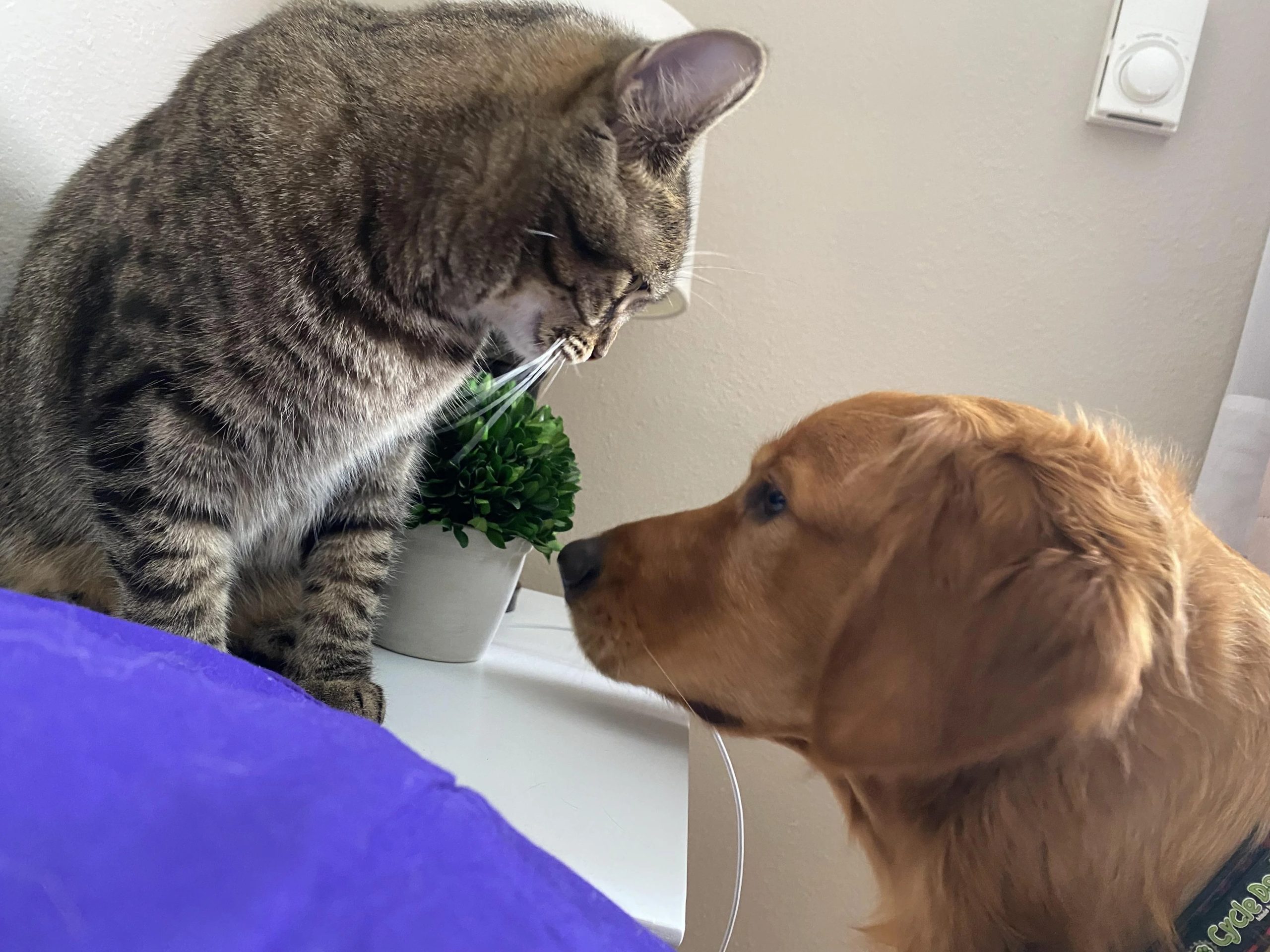So you are going to take home a Goldie? You are probably jumping with excitement right now, and we totally understand—these pups are the most ideal pet anyone could ask for, with their loyalty and compassion! Perhaps you have bought the tastiest dog food and the coziest bed, ready to welcome your pup into his new home.
But there’s just one thing standing in your way. That thing is staring at you, daring you to bring those noisy, annoying creatures into its realm. Wishing to maintain peace in your household, you can’t help but wonder, “Are Golden Retrievers good with cats?” Don’t worry, we will provide you with a detailed answer!
Are Golden Retrievers Good with Cats?

I have seen many people shaking their heads when it comes to canine-feline relationships. The two animals are very different: dogs are noisy, happy-go-lucky, and always up for some fun. Meanwhile, cats are rather reserved, laid back, and sassy. We even have an idiom that says “to fight like cats and dogs,” after all, so it’s hard to imagine these two getting along.
Here is a surprising truth: many dogs can live peacefully with cats, often forming a close relationship where they can even snuggle up against each other and sleep next to each other. Of course, this also depends on the personality of each individual and, most importantly, the characteristics of each dog breed. As someone who lives in a multi-pet household, I can say that Golden Retrievers are totally friendly with cats due to some factors, which we will list out right below.
Why Golden Retrievers Often Get Along Well with Cats?
- Affectionate nature: Golden Retrievers are popular among all dog lovers for a reason— they are calm, friendly, and absolutely affectionate. These cinnamon rolls are kind and sociable to almost any animal, including cats.
- Low prey drive: Unlike Yorkshire Terriers or German Shepherds who are famous for their high prey drive and dominant personality, Golden Retrievers are calm. Instead of hunting their prey alive, these dogs were original bred to “retrieve” prey after they were shot. Thus, they won’t behave like a threat to cats.
- High intelligence: Did you know that Goldies are among the world’s five smartest dog breeds? With an intelligence equal to a 2.5-year-old human, they can be trained easily. You can train them to be respectful to their feline housemates if you use the right techniques.
- Early socialization benefits: A Golden Retriever and a cat will get along quicker if you introduce them at an early age. As puppies, they have a better chance of recognizing other animals in the house as part of their family, not potential intruders.
Read more >> Are Golden Retrievers Smart
Introducing Your Golden Retriever to a Cat

Still, note that even a dog as calm as Golden Retriever can scare your cat so much that their welfare is compromised. Thus, a proper introduction is crucial. Although it might take time, these steps are required to ensure a harmonious relationship in the long run:
Step 1: Prepare Separate Spaces
Before the initial face-to-face meeting, create distinct areas for each pet. This setup allows both animals to have their own safe spaces where they can retreat if feeling overwhelmed. Ensure each pet has access to their essentials (food, water, litter box for the cat, bed) in their respective areas.
Step 2: Scent Familiarization
Prior to a visual introduction, help your pets become accustomed to each other’s scent. This can be done by:
- Swapping bedding or toys between the pets’ areas
- Using a soft cloth to gently rub each pet, then placing the cloth in the other pet’s area
- Allowing each pet to investigate the other’s living space while the other is absent
This process helps reduce the novelty factor when they finally meet, potentially decreasing stress and anxiety.
Step 3: Controlled Visual Introduction
When you’re ready for the first face-to-face meeting:
- Choose a neutral, spacious area in your home
- Keep your Golden Retriever on a leash for control
- Allow your cat freedom of movement, including easy access to high places
- Have treats on hand to reward calm behavior from both pets
- Keep the initial meeting brief, around 5-10 minutes
Observe both animals closely for signs of stress or aggression. If either pet appears overly anxious or aggressive, separate them and try again later.
Step 4: Gradual Supervised Interactions
As both pets become more comfortable with each other’s presence, you can begin to increase the duration and frequency of their interactions. Always supervise these meetings and be prepared to intervene if necessary. Positive reinforcement is key during this stage – reward both pets for calm, friendly behavior.
Step 5: Ongoing Management
Even after your Golden Retriever and cat seem to be getting along well, continue to:
- Provide separate feeding areas to prevent food-related conflicts
- Ensure your cat has access to high perches or hiding spots
- Maintain individual play and cuddle time with each pet
- Watch for any changes in behavior that might indicate stress or conflict
Signs That Your Golden Retriever and Cat Are Getting Along
Positive indicators of a budding friendship between your Golden Retriever and cat include:
- Mutual grooming: If you observe your dog gently licking your cat, or vice versa, it’s a strong sign of affection and acceptance.
- Sleeping near each other: Pets that feel comfortable and safe will often nap in close proximity.
- Playful interactions: Gentle play between your Golden and cat, without signs of aggression, indicates a positive relationship.
- Sharing spaces: When your pets willingly occupy the same room or piece of furniture, it suggests they’re at ease with each other.
- Relaxed body language: Look for loose, calm postures in both animals when they’re near each other.
Potential Challenges and Solutions

While many Golden Retrievers and cats form beautiful friendships, challenges can arise. Here are some common issues and how to address them:
Challenge 1: Overexcited Golden Retriever
Problem: Your Golden Retriever gets too excited around the cat, potentially scaring or annoying it.
Solution:
- Increase your dog’s daily exercise to burn off excess energy
- Train and reinforce a solid “leave it” command
- Reward calm behavior around the cat
Challenge 2: Territorial Cat
Problem: Your cat hisses, swats, or runs away from the Golden Retriever.
Solution:
- Provide more vertical spaces for your cat to feel secure
- Use pheromone diffusers to help reduce feline stress
- Allow the cat to approach the dog on its own terms
Challenge 3: Resource Guarding
Problem: Either pet becomes possessive over food, toys, or attention.
Solution:
- Feed pets in separate areas
- Provide individual toys for each pet
- Ensure both animals receive ample individual attention
When to Seek Professional Help
If you’ve followed the introduction process and are still experiencing significant issues between your Golden Retriever and cat, it may be time to consult a professional. Consider reaching out to a certified animal behaviorist or a veterinarian specializing in behavior if you observe:
- Persistent aggression from either pet
- Signs of chronic stress in either animal (e.g., changes in eating habits, excessive grooming, hiding)
- Inability to leave the pets unsupervised after several weeks of introduction
These experts can provide tailored advice and strategies to help your pets coexist peacefully.
Conclusion: A Golden Opportunity for Friendship
So, are Golden Retrievers good with cats? The answer is a resounding yes – with the right approach. Their gentle nature, intelligence, and adaptability make them excellent candidates for feline friendships. However, success ultimately depends on proper introductions, patience, and ongoing management.
Remember, every animal is an individual with its own personality. While breed tendencies can give us a good starting point, the specific dynamics between your Golden Retriever and cat will be unique. With time, patience, and positive reinforcement, you may just find yourself with a heartwarming canine-feline friendship that brings joy and laughter to your home for years to come.

As a dedicated pet writer with a passion for Golden Retrievers, I’ve spent years studying and writing information to help owners give the finest care for their beautiful companions. While I do not personally own a Golden Retriever, my writing stems from a genuine love for the breed and a desire to provide useful, well-researched information. My goal is to provide practical and useful advice to Golden Retriever owners on topics such as food selection, common health conditions, and training strategies.


